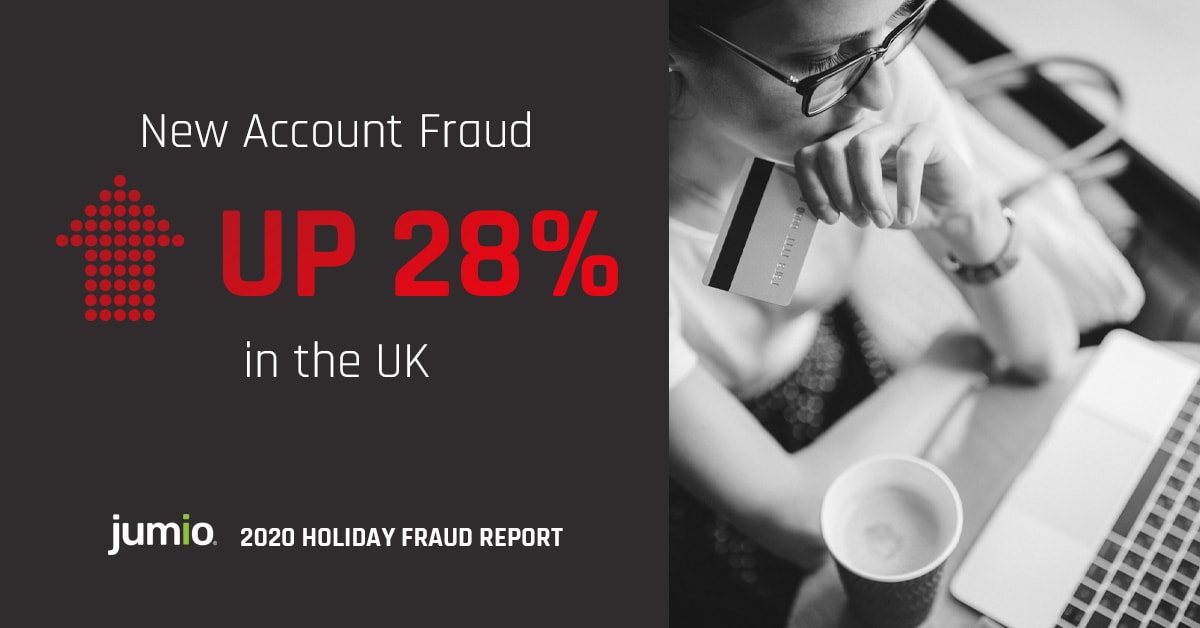
Jumio’s 2020 Holiday Fraud Report also found that the catch rate for selfie fraud was almost five times greater than for ID fraud, highlighting the growing importance of capturing a selfie during onboarding to deter new account fraud
New data from Jumio, the leading provider of AI-powered end-to-end identity verification and eKYC solutions, reveals that new account fraud based on ID verification increased 28% in the UK YOY for 2020, while the global average fell 23% compared to 2019 levels. At the same time, selfie-based fraud rates were nearly five times higher than ID-based fraud. This illustrates the growing number of stolen ID documents available on the dark web for purchase and, more importantly, the growing need to determine if an ID is authentic and belongs to the user.
The fourth edition of Jumio’s Holiday New Account Fraud Report examines fraudulent attempts to open a new account using a manipulated government-issued ID and a corroborating selfie. Selfie-based fraud describes fraudulent attempts to use a picture or video (e.g., deepfake) instead of a genuine selfie to corroborate a digital identity. The fraud rate associated with the selfie averaged 4.92% in the UK in 2020, compared to 1.03% for ID-only verification.
The report is based on the analysis of tens of millions of transactions from a variety of industries and geographies around the globe. It targets the period of January through October each year and the month of November to cover the holiday shopping period.
Key findings include:
- Fraud rates in the UK, based on the ID document, have almost doubled from 2017 levels, and fraud levels in November were a full one-third higher than fraud levels from January to October in 2020.
- Compared to other major European countries, the UK had the highest fraud levels, second only to Spain which experienced a 25% increase in ID-based fraud in 2020 (over 2019 levels).
- By virtue of requiring an ID and a selfie as part of the identity proofing process, Jumio has seen 80% less fraud compared to customers who only required a government-issued ID. Moreover, this finding demonstrates the chilling effect that the selfie requirement has on would-be fraudsters who abandon the process before taking the selfie.
- Fraud rates differ significantly by implementation channel and are more than twice the level for web and API-based implementations compared to SDK (mobile apps) implementations. The higher fraud rates are presumably the result of enabling end users to upload their own ID images instead of leveraging the webcam or the smartphone’s camera. This enables bad actors to upload manipulated ID images or use an image of a legitimate ID that was stolen or found on the dark web or through a Google Image search.
- The online gaming and cryptocurrency verticals had the highest levels of new account fraud, suggesting that they remain ripe targets in the UK for money laundering and other forms of financial crime.
- Fraud rates for UK passports and driver’s licenses more than doubled from 2017 levels.
“This year’s Holiday Fraud Report unearths a number of interesting global fraud trends that enterprises adopting biometric-based identity verification should carefully consider as they architect the new account journey,” said Philipp Pointner, Jumio’s chief product officer. “It highlights the critical importance of requiring a selfie to corroborate the remote user’s digital identity. By including both ID verification and identity verification with live selfies and liveness detection during the account onboarding process, organisations can more effectively deter fraudsters and better protect their ecosystems.”
Jumio’s findings are especially timely as more and more organisations are migrating from legacy methods of identity verification, which are not equipped to detect sophisticated methods of new account fraud. According to Gartner’s 2020 Market Guide for Identity Proofing and Affirmation, 80% of organisations will be using document-centric identity proofing as part of their onboarding workflows by 2022 — an increase from approximately 30% today.
Download the Jumio 2020 Holiday New Account Fraud Report here for additional learnings and insights.
About Jumio
When identity matters, trust Jumio. Jumio’s mission is to make the internet a safer place by protecting the ecosystems of businesses through a unified, end-to-end identity verification and eKYC platform. The Jumio KYX Platform offers a range of identity proofing and AML services to accurately establish, maintain and reassert trust from account opening to ongoing transaction monitoring.
Leveraging advanced technology including AI, biometrics, machine learning, liveness detection and automation, Jumio helps organizations fight fraud and financial crime, onboard good customers faster and meet regulatory compliance including KYC, AML and GDPR. Jumio has verified more than 300 million identities issued by over 200 countries and territories from real-time web and mobile transactions. Jumio’s solutions are used by leading companies in the financial services, sharing economy, digital currency, retail, travel and online gaming sectors. Based in Palo Alto, Jumio operates globally with offices in North America, Latin America, Europe and Asia Pacific and has been the recipient of numerous awards for innovation. For more information, please visit www.jumio.com.
Europe Media Contact
Gemma Lingham
FleishmanHillard Fishburn
[email protected]
+44-208-618-2812
U.S. Media Contact
Alex Mercurio
10Fold Communications
[email protected]
925-271-8227
